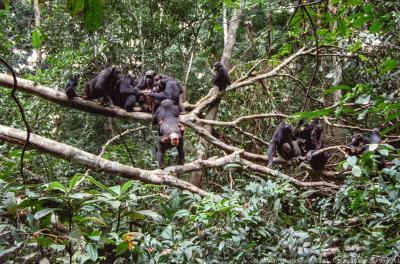This news release is available in German.
The ability to form long-term cooperative relationships between unrelated individuals is one of the main reasons for human's extraordinary biological success, yet little is known about its evolution and mechanisms. The hormone oxytocin, however, plays a role in it. Researchers of the Max Planck Institute for Evolutionary Anthropology in Leipzig, Germany, measured the urinary oxytocin levels in wild chimpanzees after food sharing and found them to be elevated in both donor and receiver compared to social feeding events without sharing. Furthermore, oxytocin levels were higher after food sharing than after grooming, another cooperative behaviour, suggesting that food sharing might play a more important role in promoting social bonding. By using the same neurobiological mechanisms, which evolved within the context of building and strengthening the mother-offspring bond during lactation, food sharing might even act as a trigger for cooperative relationships in related and unrelated adult chimpanzees.
Humans and a few other social mammals form cooperative relationships between unrelated adults that can last for several months or years. According to recent studies the hormone oxytocin, which facilitates bonding between mother and offspring, likely plays a role in promoting these relationships. In chimpanzees, for instance, increased urinary oxytocin levels are linked to grooming between bonding partners, whether or not they are genetically related to each other.
To examine the ways in which oxytocin is associated with food sharing, Roman Wittig and colleagues of the Max Planck Institute for Evolutionary Anthropology in Leipzig have collected and analyzed 79 urine samples from 26 wild chimpanzees from Budongo Forest in Uganda within one hour after the chimpanzees either shared food or socially fed without sharing. The result: A chimpanzee's urine contained significantly higher levels of oxytocin after sharing food with another group member than just after feeding socially regardless whether the animal was the donor or the receiver of the food. "Increased urinary oxytocin levels were independent of whether subjects gave or received food, shared with kin or non-kin, shared with an established bond partner or not, or shared meat or other food types", says Roman Wittig.

After hunting, chimpanzees share a red colobus monkey.
(Photo Credit: Roman M. Wittig / Taï Chimpanzee Project)
In addition, the researchers found that the oxytocin levels associated with food sharing were higher than those associated with grooming, indicating that the rarer food sharing has a stronger bonding effect than the more frequently occurring grooming. "Food sharing may be a key behaviour for social bonding in chimpanzees", says Wittig. "As it benefits receivers and donors equally, it might even act as a trigger and predictor of cooperative relationships."
The researchers further suggest that food sharing likely activates neurobiological mechanisms that originally evolved to support mother-infant bonding during lactation. "Initially, this mechanism may have evolved to maintain bonds between mother and child beyond the age of weaning", says Wittig. "It may then have been hitch-hiked and is now also promoting bond formation and maintenance in non-kin cooperative relationships."
The Latin roots of the word companion ('com = with' and 'panis = bread') may indicate a similar mechanism to build companionship in humans. Whether human urinary oxytocin levels also increase after sharing a meal with others will be a subject for future studies.




Comments